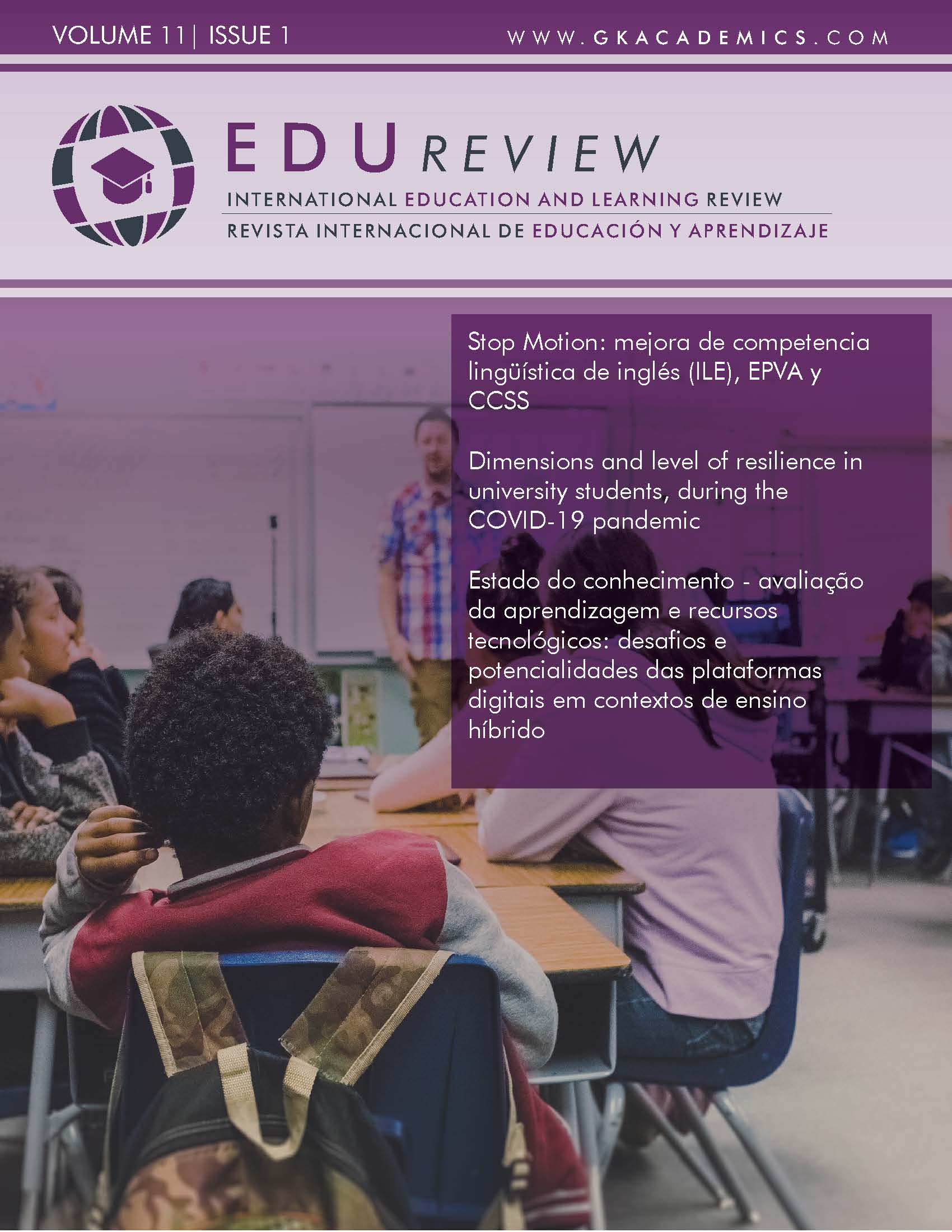Educational innovation
Promotion of innovative practices related to directive management in a network of schools served by Fe y Alegría Nicaragua
DOI:
https://doi.org/10.37467/revedu.v11.3576Keywords:
Challenges, Covid19, Directive Management, Innovative Practice, Gender Approach, TICAbstract
This work shows the challenges that teachers have had, as a result of the COVID 19 pandemic, which has hit the world population. It has a mixed approach, prevailing throughout the study the triangulation of quantitative and qualitative data. The Executive Management Excellence Index (IEGD) was calculated using the indicators of the quality, improvement system of the International Federation of Fe y Alegría; likewise, the assessment of 35 innovative practices with a gender perspective and the use of Information and Communication Technologies (ICT), using established criteria.
Downloads
Global Statistics ℹ️
|
486
Views
|
172
Downloads
|
|
658
Total
|
|
References
Accerenzi, M., Camarero, E., Hernández, A., Muñoz, Y., Tórrez, M. y Vásquez, M. J. (2020). Evaluación del cierre de escuelas debido a la COVID 19 en Nicaragua: estudio de la incidencia que está teniendo en las familias, en la situación de la pobreza y en el incremento de la brecha educativa. Fundación ETEA.
Aguilar, M. (2018). Reflexiones críticas sobre igualdad de género desde la perspectiva del derecho a la educación. EDUCA, 1, 12-17.
Coordinación regional Occidente. (s.f.). Guía metodológica para la sistematización de prácticas innovadoras. Fe y Alegría Nicaragua.
Fe y Alegría Nicaragua. (2019). El impacto de la formación a los grupos metas (equipos directivos, docentes y estudiantes) del convenio Acción 3 y 8 en centros de Fe y Alegría. Autor.
Federación Internacional Fe y Alegría. (2013). Mundo escolar. Obtenido de Simposio Internacional Innovación Fe y Alegría: https://bit.ly/3JeCE5f
Federación Internacional Fe y Alegría. (2010). Programa Educación de Calidad (V edición). Bogotá: Autor.
Fidalgo, A. (2011). La innovación docente y los estudiantes. La cuestión universitaria, 84-91.
García, F. (2018). Informática inmersa en la propuesta pedagógica de Fe y Alegría. EDUCA, 1, 25-30.
González, L., Glasserman, L., Ramírez, M. y Peñalvo, F. G. (2017). Repositorios como soportes para diseminar experiencias de innovación educativa. En M. Ramírez-Montoya y J. Valenzuela-González, Innovación Educativa. Investigación, formación, vinculación y visibilidad (pp. 259-272). Madrid.
Llancavil, D., & Lagos, L. (2016). Importancia de la educación inclusiva para el trabajo con niños con talento. Redalyc.org, 5(1), 168-183. DOI: https://doi.org/10.4151/07189729-Vol.55-Iss.1-Art.391
Méndez, M. (2018). Una auténtica cultura de innovación en Fe y Alegría. EDUCA, 1, 32-38.
Méndez, M. y García, F. (s/f). Ruta metodológica para registro de prácticas innovadoras integrando género y TIC. Fe y Alegría Nicaragua.
Mora, D. Y. (2017). Curso de actualización en gestión educativa y comunitaria con énfasis en la dimensión humana, pedagógica, organizacional y comunitaria. Fe y Alegría Nicaragua.
Murillo, V., Riveros, E. y Castillo, L. F. (2014). Género tantas perspectivas como personas. Calidad, 5.
Nascimiento, M., & Segundo, M. (2011). Hombres, masculinidades y políticas públicas: aportes para la equidad de género en Brasil. En F. Aguayo y M. Sadler, Masculinidades y políticas públicas: involucrando hombres en la equidad de género (pp. 50-63).
Riveros, E. (12 de octubre de 2016). El concepto de calidad de Fe y Alegría y su sistema de mejora. Una mirada alternativa. Obtenido de https://bit.ly/3FksJKe
Valenciano, G. (2009). Construyendo un concepto de educación inclusiva: una experiencia compartida. En M. P. Sarto y M. E. Venegas, Aspectos claves de la Educación Inclusiva (pp. 13-24). Publicaciones del INICO.
Zambrano, P. (2019). La innovación formativa en el proceso de enseñanza y aprendizaje basado en el modelo experiencial. Rehuso, 4(2), 94-102. DOI: https://doi.org/10.33936/rehuso.v4i2.2901
Downloads
Published
How to Cite
Issue
Section
License
Those authors who publish in this journal accept the following terms:
-
Authors retain copyright.
-
Authors transfer to the journal the right of first publication. The journal also owns the publishing rights.
-
All published contents are governed by an Attribution-NoDerivatives 4.0 International License.
Access the informative version and legal text of the license. By virtue of this, third parties are allowed to use what is published as long as they mention the authorship of the work and the first publication in this journal. If you transform the material, you may not distribute the modified work. -
Authors may make other independent and additional contractual arrangements for non-exclusive distribution of the version of the article published in this journal (e.g., inclusion in an institutional repository or publication in a book) as long as they clearly indicate that the work was first published in this journal.
- Authors are allowed and recommended to publish their work on the Internet (for example on institutional and personal websites), following the publication of, and referencing the journal, as this could lead to constructive exchanges and a more extensive and quick circulation of published works (see The Effect of Open Access).













